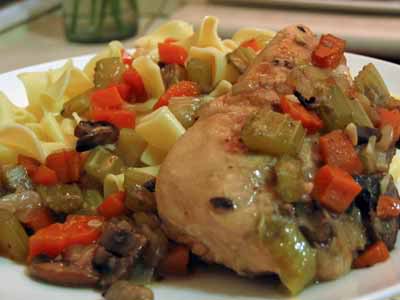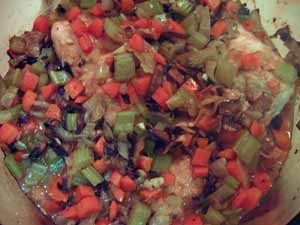
When you’re one of four kids growing up in a three-bedroom apartment without much money, you find yourself taking turns a lot. My brothers and I took turns sitting in the “get-up” seat at supper (which meant popping up and down to help bring out food, clear plates, etc.), doing the dishes, squishing into the way-back of the station wagon, and shlepping the dirty clothes down to the basement laundry room with my dad. None of these were things any of us actually wanted to do, so taking turns smacked of negativity, but by far the thing we liked to do least was help pack up the meat after a trip to the butcher.
My family kept kosher, so supermarket meat was off-limits. Every few Sundays my parents would load us all into the car and drive a half-hour to Yonkers, where there was a relatively affordable self-serve kosher butcher. To get there we passed several others, but they were cut-to-order places with higher prices; we were barely getting by, so the savings on a freezer full of meat for six was enough to make it worth the trip. Even at the cheaper place, kosher meat could easily cost twice as much per pound as the non-kosher variety. When my parents fought about money, which happened with alarming frequency, my mother’s trump card would always be kashrut: “We can’t afford to be kosher anymore. Kosher is for rich people.” To hear my mother trading religious beliefs for money terrified me—as much of a drag as I found it (no McDonald’s except the Filet-o-Fish, no bacon, no ice cream after a meat meal), keeping kosher didn’t seem like something you could abandon for expediency.
I hated the butcher. It smelled like dead things, tangy and deep. Sawdust covered the checkered tile floor—when I asked why, my dad told me it was to dry up any drips of blood. Burly men in brownish-red-splattered white coats hauled trays of freshly-cut meat to the cases, and they were never too happy to have four kids running around the place. But while we were too young to stay home alone, my parents didn’t have much choice. They’d load up the cart with the least-expensive cuts, checking to see if London Broil or breast of veal was on sale that week, carefully selecting the best-looking packages or asking Bruno, the head butcher, to cut something special for us. His wife worked with my dad, so he was nice about it.
If the trip to the butcher wasn’t bad enough, unpacking it all at home was the worst part. My dad would pile all the bags on the floor of our galley kitchen, and one of us kids would have to help him unwrap all the packages and transfer the meat into Ziploc freezer bags. Each chicken breast got bagged individually—it defrosted faster, and that way my mom could take as many or as few as she needed for a particular dish. I dreaded my turn. The cold, slippery feel of raw meat repulsed me—especially the chicken, which often had stray feathers still attached, to be plucked with a strawberry-shucker before freezing. It was too close to its original form, I think—chopped meat or a roast never bothered me as much as a chicken breast with wing attached. You could see what it used to be: a living, squawking creature. Between the tight, claustrophobic setting and the stench of the meat, I was very little help to my dad, I think. I spent the whole time with my nose wrinkled and my fingers curled in disgust, praying for him to hurry and finish.
As much as I hated touching raw chicken, I never had a problem eating the cooked ones. Every year at Passover my mom made Smothered Chicken, my favorite recipe. It’s a simple braise, just some chicken pieces and vegetables in double-strength chicken broth, but the meat is browned in matzoh meal first and that alchemy transformed it into something ambrosial and succulent. The broth thickens ever-so-slightly as it mixes with the juices of the chicken, and because the vegetables sit above the liquid, they release their flavor while still holding their texture. I loved this dish so much that eventually it graduated from an annual, Passover-only tradition into a special occasion dish for me. When I came home on a break from college, and in later years for my birthday, this was the dish I always requested.
A few years ago my mom gave me the recipe, and now I make it myself from time to time. I’m not kosher anymore but I still buy kosher chicken—regular chicken just doesn’t taste as good to me—so this is one dish from my childhood that tastes exactly as I remember it. (And I still hate packing up the chicken, but now that I’m a grown-up it seems a little silly to make such a big deal out of it.)

Smothered Chicken
Serves 4-6
4-5 lb pullet, cut up, or 6 chicken breasts, depending on preference. [I skin them–because it’s braised the skin doesn’t get crispy anyway, and this saves a lot of fat. If you don’t skin them, use as little oil as possible in the rest of the dish or it may come out greasy]
½ cup matzo meal
½ t. salt
1/8 t. pepper
¼ t. garlic powder
¼ cup oil
1-2 large onions, sliced
3 cloves garlic, chopped
3 ribs celery, with leaves, diced
2 large carrots, diced
1 cup fresh mushrooms, sliced
1 10 ½ oz. can clear condensed chicken soup, undiluted [I only had regular cans of chicken broth, so I added half a bouillon cube to approximate the intensity of condensed soup.]
Preheat oven to 325. Mix matzo meal and all seasonings in a large Ziploc bag. Shake individual pieces of chicken, to coat. Brown pieces in hot oil, in a large skillet. Place the browned pieces of chicken in a covered baking dish or Dutch oven. In the same skillet, use the remaining oil (or add a bit more, as needed) to sauté the vegetables and garlic, until the onion is soft. Cover the chicken with the sautéed vegetables. Heat the chicken soup, or just pour it in.
Cover and bake for 1 ½ hours, or until chicken is cooked through. Serve with noodles or mashed potatoes.